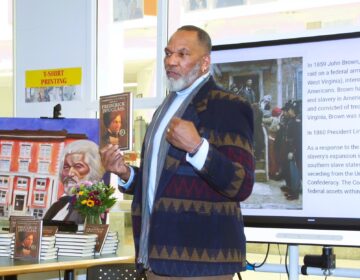Asante’s 'Buck': Philly memoir will soon be film. Will districtwide curriculum be next?
“Buck,” a gritty coming-of-age tale about one young man’s evolution from thug to scholar, was published in 2013 and praised by critics for its honesty and poetic language.
Listen 0:00
Matthew Ramirez and Christopher Rodriguez, ninth-graders at The Arts Academy at Benjamin Rush, could relate to the different themes explored in M.K. Asante¹s memoir, "Buck." (Annette John-Hall)
Philadelphia author M.K. Asante has been hailed as a voice for a generation. His memoir, “Buck,” a gritty coming-of-age tale about one young man’s evolution from thug to scholar, was published in 2013 and praised by critics for its honesty and poetic language. Now, the Sundance Institute has awarded Asante a feature film grant to adapt “Buck” into a film, scheduled for release in 2019.
“ ‘Buck” is a Philadelphia story in so many ways. In fact, the city is a character in the book, said Asante who, at 34, is a tenured professor of creative writing and film at Morgan State University in Baltimore.
More than anything, Asante sees “Buck” as a teaching tool. Since it was published, he’s traveled the country, talking to a range of groups from senior citizens in Idaho to middle-schoolers in Oakland, California. He’s speaking Wednesday at the Athenaeum of Philadelphia at a professional development sponsored by Safe Kids Stories to help teachers learn how to engage students with “Buck,” and texts like it.
Asante said the most gratifying compliment he receives is from teachers who tell him about the “bad” kid, the one who never read, who never took a book home, but can’t put “Buck” down.
The memoir resonates with high-achieving students, too.
Like most students, Matthew Rivera, a ninth-grader at The Arts Academy at Benjamin Rush in the Northeast, dreaded having to do his assigned summer reading. But that was before he read “Buck.”
“This book, like I was was actually interested in reading it,” Rivera said. “I wanted to read it. It wasn’t something that I wanted to put off until the last moment. It’s been a while since a teacher gave us something real to read. Like, with meaning.”
‘Talent and incredible persistence’
Unflinching and heartbreaking at times, the book addresses universal themes of mental illness, incarceration, and abandonment. At one point, Asante has dropped out of school and is pretty much raising himself. It wasn’t until his mother put him in Crefeld School, a small alternative school in Chestnut Hill, that his life began to change.
“When he started writing what he knew and writing about himself, all of a sudden you could see a lot of talent there,” said Stacey Cunitz, who taught Asante creative writing at Crefeld and is now the director of college counseling. “And, in the end, you have to have both talent and incredible persistence as a writer. You have to be willing to write. And M.K. wrote endlessly.”
Of course, all the fanfare over “Buck” hasn’t come without controversy.
Antoinette Davis teaches English and creative writing at Benjamin Rush. She’s taught “Buck” for three years and is part of the team that is devising a districtwide curriculum.
“I wanted to have a book that was different from what the majority of our students see, but would touch the students that felt like they weren’t being seen,” Davis said.
Davis admitted she’s also gotten pushback from a few parents who take issue with Buck’s profanity, its raw descriptions of drug dealing, violence, and its sexual scenes. Davis says parents can opt their kids out of reading the book if they so choose.
Real look at teens’ world
But Ebony Thomas, a professor in the Graduate School of Education at Penn and writer of the curriculum, argued some parents need to recognize the world teens actually face. It’s not necessarily the one parents imagine, especially for teens of color.
“On the one hand, black children should not be exposed to what is perceived as inappropriate or negative content in the literature that they receive in school,” Thomas said. “However, when the child leaves the classroom, everything around them shows how much they are devalued in society.”
William Hite, Philadelphia’s superintendent of schools, has already given the book the green light and has recommended it to all of his high school principals, and invited Asante to do a professional development session with them.
“I think part of it is a broader approach to use good literature to instruct,” Hite said. “I think that this work is good literature, and, because of that, many children can relate to it.”
WHYY is your source for fact-based, in-depth journalism and information. As a nonprofit organization, we rely on financial support from readers like you. Please give today.




